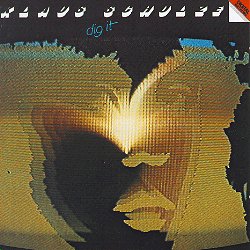| Discography |
 |
Reviews |
| » ... Als einer der ersten benutzt KS keine herkömmlichen, analogen Synthesizer mehr, sondern
einen Digitalcomputer. Und das Ding hat mir die Beine weich werden lassen, ich fiel in meinen
Ikeasessel und mußte sofort die Kopfhörer aufsetzen. ... Der Klang ist klar wie ein Diamant. Mein
Kopf schien zu zerplatzen. Jede Struktur wird sichtbar. Die Idealvorstellung von elektronischer
Musik ist hörbar geworden.« (12/80, B. Weich, "Musiker Music News", Germany) |
|||
| » Incroyable! mais vrai... est la meilleure définition de son dernier sillonage musical. Dig It est
le premier disque digital enregistré directement sur la graveuse par son compteur digital G.D.S.,
si vous avez moindrement un bon système de son... La profonde virilité des tymbales et des gongs
à la VANGELIS et les succions métallurgiques du synthé vous feront sûrement cracher du mercure.
L'album est surtout axé sur les rythmes et percussions, par example Weird Caravan, une
attirance de reggae pour les discothèques martiennes, mais attention cela ne veut pas dire qu'il
est commercial, il est tout simplement plus accessible, moins rêvasseur, pas de melotron angélique
ni de tonnes d'acier se fracassant contre des vents violents. ...un stéréophonie superbe sur The
Looper isn't a Hooker spécialement et sa voix dissimulée par le vocoder sur deux piéces
seulement... à mon avis, la musique ne s'explique pas... elle s'écoute...« (12/80. "Pop Rock", Canada) |
|||
| » Blubbern, zischen, rauschen, so hat schon mancher die Musik von Klaus Schulze grob
beschrieben. Auf der B-Seite findet man das durchaus bestätigt. Aber die A-Seite zeigt, wie
vielseitig und interessant Elektronik-Musik sein kann. Hier werden vor allem Percussions-Instrumente (Schlaginstrumente) eingesetzt. Das ganze macht einen äußerst rockigen Eindruck.
Bei Weird Caravan spielt sogar die New Wave-Gruppe IDEAL mit. Durch die Digital-Aufnahmetechnik wird die Platte zu einem interessanten Klangerlebnis.« (1/81, "Elan", Germany) |
|||
| » Desert Island Classics. Albums You Shouldn't Be Without: Klaus Schulze. Dig It. Considered by many to be the impetus of modern electronics in Germany, this is his last effort. He seems to have come full circle with this one, returning to a more classical approach. Especially on side 2, Syntasy evokes visions of futuristic, wagnerian epic. The use of choral voices and ethereal synth modulation make this record highly recommended....« (4/81, P. Moser, "Co-op Radio Programme Guide", Canada) |
|||
| » Extra Classic: Klaus Schulze Dig It. Luciano Berio "Differences". Karlheinz Stockhausen
"Inori/Formel". It may seem a bit of cheek (in a "Rock Paper" too!) but from up here on the soapbox the barrier between the first and second/third albums mentioned above seem to be shimmering and partially dissolving. You've seen the latter two names bandied about all over the place and their availability from what is primarily a rock label is as good an excuse as any to say hello. There are strong structural similarities between Schulze's Synthasy (off Dig It) and Berio, indeed stepping towards Stockhausen. Schulze has a number of things going for him. Brightest star in the electronic firmament; last remaining experimentalist on the increasingly reactionary Brain label; jointly responsible, with the Tangs, for the rabid multiplication of Krautsynths acts. And he also gives the workaday dooding style a clear berth. As the trio of pieces on side one shows, he takes risks with the formal. No funny noises, no sub-Tangs excursions. He constructs his music with cluttering, barely-structured percussion, tiny chiming marches, offbeat funk pulses, and a subtly, understated use of his battery of machines. Half of the 23-minute Synthasy is comprised of subterranean drones, drum eruptions, sneaky modulations, fluttering drill sounds and sudden, unexpected choral lift-offs; all of which straddle the gap between rock's adventurers and --- The likes of Italian composer Luciano Berio... « (1/81, J. Gill, "Sounds", Great Britain) |
|||
| » ...für mich ist Dig It die LP des Jahres 1980, und wer nicht zumindest mal versucht, sich diese
Musik anzuhören... die 80er Jahre werden elektronisch, Freunde!« (1/81, JL, "FFB Zeitung", Germany) |
|||
| » Zum Schluß noch ein ganz besonderer Leckerbissen. Klaus Schulzes neues Album Dig It ist
die erste elektronische Digital-LP auf dem deutschen Musikmarkt. ... Klaus Schulze ist eigentlich
immer einen Schritt weiter als seine musikalischen Pendants. So auch auf seinem neuesten Werk.
Wieder einmal konnte er eine LP produzieren, deren Musik nicht von der Tagesaktualität leben
will, sondern als mode- und zeitunabhängige Form immer gefällt.« (1/81, "2002", Germany) |